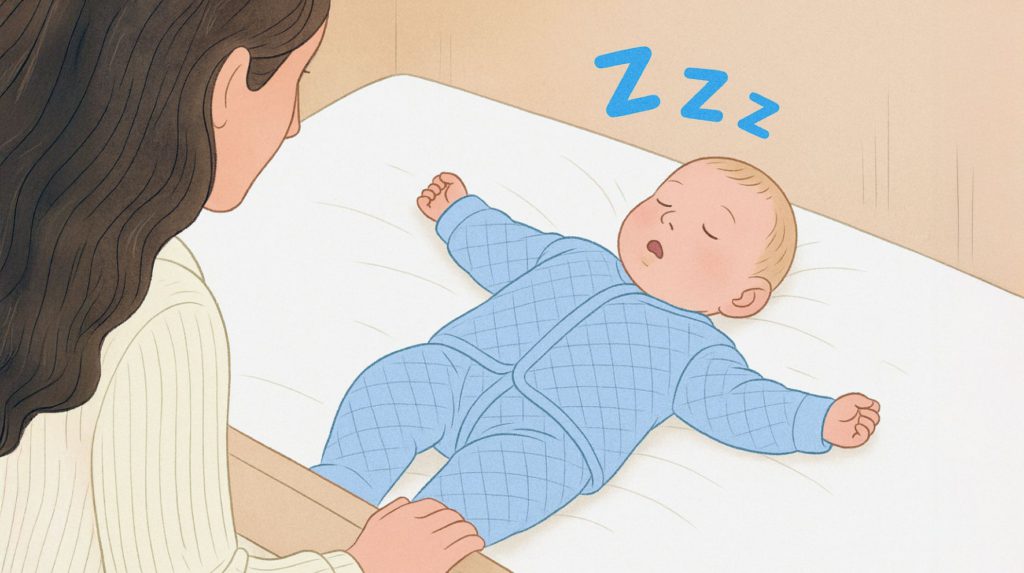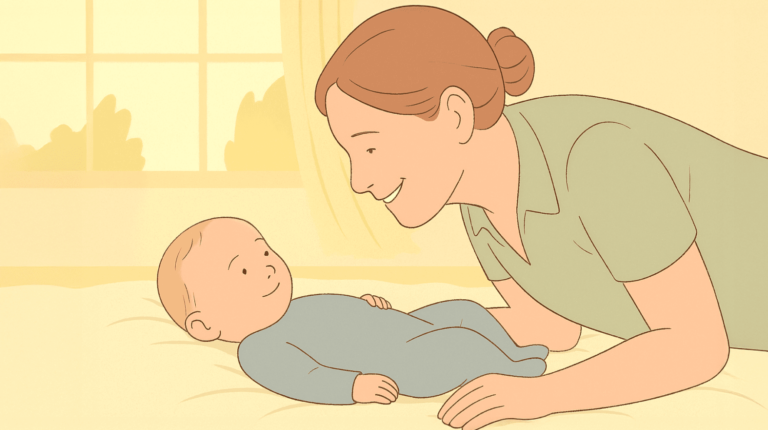Your baby’s finally asleep, the room is quiet and you catch a small snuffle or rough breath that makes you listen closer.
While most parents assume it’s snoring, many new parents wonder: “Do babies actually snore, or is it just their breathing that sounds a bit louder sometimes?”
This blog unpacks exactly that – helping you understand what’s normal, when to relax, what you can do, and when it might be worth checking in with your pediatrician.
We also spoke to Laura Hunter, LPN, Co-Founder of Moms on Call, Pediatric Nurse who broke down what’s behind those small snores and sniffles and when parents might want to pay closer attention.
Do babies snore?
Yes, babies really do snore! Even newborns do. “… so you may hear soft snorts, whistles, or even squeaks while they sleep. Most of the time, it’s nothing to worry about. It’s just part of those adorable but noisy newborn nights,” says Hunter.
Newborns spend a lot of time in active (REM) sleep, a stage where breathing, twitching, and even gentle snoring are common.
In fact, studies show that about 9% of infants snore regularly by around three months of age – a reminder that these little nighttime sounds are usually a normal part of healthy development.
“ Babies are loud sleepers. It’s often just their bodies doing the work of growing and adjusting to life outside the womb.”
Why do babies snore?
It’s normal for babies to snore softly from time to time, and in most cases, it’s harmless. Snoring or noisy breathing can also happen for a few other common reasons.
Common nasal congestion
As babies have very small nasal passages, even minor mucus or dryness can cause snoring sounds. This nasal congestion, often from colds or mild allergies, is a common cause of normal snoring in infants and usually resolves as they grow.
Narrow airways in babies
Babies naturally have narrower airways, especially in the lower part of the throat. Because of this, even a little relaxation of the airway muscles or a slight blockage during sleep can make their breathing sound noisy or cause soft snoring.
Babies breathe faster
Babies breathe faster than adults because their small bodies use energy quickly and need more oxygen. Even a tiny blockage in their airway, which an adult might not notice, can make their breathing sound louder or snore like.
That said, most newborns will have quieter breathing as their nasal passages grow and mature.
What affects snoring in babies? How can parents help?
What seems like a small detail – sleep position, room air, even feeding habits can actually shape how smoothly your baby breathes.
Here are a few everyday factors that can affect snoring in little ones and how to help.
Allergies and nasal congestion
Some babies are sensitive to dust mites, pet dander, or even certain detergents. These can trigger an allergic response, making the tissues inside the nose swell and produce extra mucus. That congestion can make your baby’s breathing sound snuffly or snore-like.
How to help:
Keep your baby’s sleep space clean and wash bedding often in fragrance-free detergent.
Environmental irritants
Smoke, strong scents, or dry air can bother your baby’s tiny airways. Their nasal passages are small and sensitive, so any irritation can make breathing louder or lead to mild snoring.
How to help:
Avoid smoking or using air fresheners near your baby and keep the room well-ventilated.
Expert tip: If the room feels stuffy, a floor fan pointed toward a corner can help circulate air without blowing directly on the baby.
Silent reflux (GERD)
When stomach contents back up into the throat, it can irritate the airway and cause snoring or noisy breathing. Babies with reflux may also cough, sound hoarse, or struggle during feeds.
How to help:
Feed your baby in an upright position and keep them propped slightly after feeding for 20–30 minutes. Offering smaller, more frequent feeds can also help reduce reflux.
Sleep position
Back sleeping keeps your baby the safest and reduces the risk of SIDS, though it may occasionally cause mild snoring. Other positions might lessen noise but increase safety risks.
How to help: Always place your baby on their back for sleep on a firm, flat surface. Avoid pillows, wedges, or side sleeping because safety comes first.
Dry air or room conditions
Dry indoor air can make your baby’s nose and throat feel irritated, leading to snoring or noisy breathing.
How to help:
Ensure the room temperature is around 68–72 degrees and consider a cool mist humidifier if the air is dry.
So isn’t it safe to say that even small changes at home can make a big difference in how peacefully your baby breathes?
How loud is too loud?
Once you know baby snoring is common, the next question is: how loud is normal? Paying attention to the sound itself can help you spot when it’s harmless and when it might need a closer look.
Soft snoring
It is a low, gentle sound that doesn’t disturb your baby’s sleep and is usually normal.
Rattly or harsh snoring
It is a louder, rough, or vibrating sound that may suggest some nasal or throat blockage and should be monitored.
Disruptive snoring
It is snoring that interrupts your baby’s sleep or comes with gasping, choking, pauses in breathing, or feeding troubles and it should be checked by a pediatrician right away.
Commonly confused conditions with snoring: What parents should know
It’s easy to confuse harmless baby snores with something more serious, like sleep apnea or wheezing. Here’s how to tell the difference.
Crackles
Crackles sound like popping or rattling and are typically linked to infections like bronchiolitis or pneumonia. These noises may be mistaken for snoring, but crackles occur with each breath and often need medical attention.
Noisy Breathing (“Stertor”)
Stertor is a low-pitched, snoring-like sound that may be heard in several upper airway obstructions, and can sometimes be confused with classic snoring noise.
Wheezing
According to Hunter, “Snoring usually sounds like a soft rumble or snort, coming from the nose or back of the throat.” The expert clarifies, “Wheezing, on the other hand, is a more high-pitched, whistling sound when your baby breathes out and it can be a sign of something more serious like illness or airway trouble.”
She further points out, “Wheezing should always prompt a call to your pediatrician.”
Deviated Septum or Enlarged Tonsils/ Adenoids
These structural conditions can block airflow and cause snoring or other noisy breathing during sleep, sometimes mistaken for typical snoring but may require further evaluation for persistent symptoms.
Sleep Apnea
Sleep apnea includes periods of silence, gasping, or choking, and can cause restless sleep, poor feeding, slowed growth, and daytime irritability. If you notice loud snoring with breathing stops and other symptoms, it’s important to consult a doctor.
Stridor
Stridor is a harsh, high-pitched sound from restricted airflow in the upper airway (voice box/trachea). Unlike snoring, stridor can occur both when awake and asleep, and it often worsens when the baby is lying on their back. It may be caused by laryngomalacia or other airway abnormalities.
Laryngomalacia
Laryngomalacia is the most common cause of persistent loud stridor and noisy breathing in infants, resulting from a floppy upper airway. Symptoms can be confused with snoring, but are present awake or asleep and may affect feeding, growth, and oxygen levels.
When to call a doctor?
Most baby snores are normal, but sometimes they can signal something worth a closer look. Talk to your pediatrician if you notice any of the following:
- Loud, ongoing snoring that happens more than three nights a week.
- Pauses in breathing, gasping, or choking sounds while your baby sleeps.
- Restless sleep or frequent waking that leaves your little one overtired.
- Mouth breathing or trouble breathing comfortably through the nose.
- Feeding difficulties or slow weight gain.
- Unusual sleepiness, fussiness, or developmental changes during the day.
Hunter adds that it’s not just the sound of snoring that matters, but what you see while your baby breathes.
“ If you notice gasping, continuous grunting, or the chest visibly sinking in between or under the ribs, it’s time to call your pediatrician. Other red flags include nostrils flaring, lips or skin turning bluish, fever, extreme sleepiness, or refusing to eat.”
FAQs
Q: 1. Can teething or a cold cause temporary snoring?
A: Absolutely. Swelling, drooling, or congestion during teething or mild colds can make babies snore more than usual. The sound should fade once your baby feels better.
Q: 2. Does snoring affect a baby’s sleep quality?
A: Mild, occasional snoring usually doesn’t. But if it’s loud or disrupts sleep, your baby may not get enough deep rest. If you notice frequent waking or irritability, check with your pediatrician.
Q: 3. Can using a pacifier affect snoring?
A: Pacifiers can sometimes help by keeping the airway slightly open, but if snoring worsens or breathing seems strained, it’s best to remove it during sleep and observe.
Q: 4. Should I record my baby’s snoring before seeing a doctor?
A: That’s actually a great idea. A short video or audio clip can help your pediatrician understand what’s happening and decide if further testing is needed.
Q: 5. Do babies outgrow snoring?
A: Yes, most babies do outgrow snoring. As your baby’s airways grow and muscles strengthen, mild snoring often fades on its own. If it persists beyond infancy, check with your pediatrician.
Sources:
- Snoring in infants. NCBI. 2000. “Snoring, noisy breathing in sleep and daytime behaviour in 2-4-month-old infants”
- Prevalence of snoring in infants. NCBI. 2011. “Prevalence of snoring and associated factors in infancy”
- Development of airways in infants. Pediatric Pulmonology. 2020. “Structural and functional development in airways throughout childhood: Children are not small adults”
- Breathing issues in babies. AAP. “Stridor & Laryngomalacia: Is My Baby’s Noisy Breathing Serious?”
- Sleep apnea in infants. NCBI. 2012. “Obstructive Sleep Apnea in Infants”



